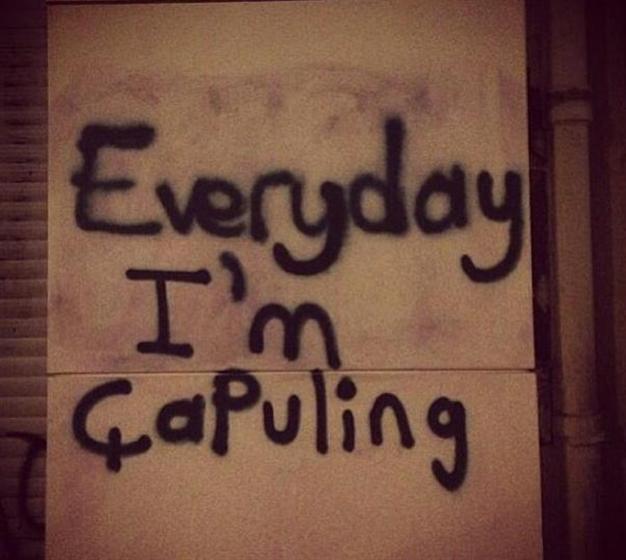'To chapul or not to chapul': Gezi Park takes a swipe at power, with laughter
Stefan Martens / Özgün Özçer ISTANBUL - Hürriyet Daily News

The ultimate impact of the Gezi Park protests on the country’s politics or economy remains unknown for now. But if there is one legacy which seems certain to have sunk its way into popular culture, it is the jokes and satire that have been coined by the protesters during the last two weeks. Shaking off the timidity of raising their voice against those who in power, humor has become the perfect revolutionary and insidious weapon to attack the sacred underpinnings of the state.
Displaying a previously unseen tendency, protesters have broken the culture of obedience to the government with a surprising blend of humor that laughs in the face of the institutions of the mighty.
The more the police have run amok throwing tear gas bombs to suppress the protest, the more Turkish protesters have responded with devastating jokes.
When the Prime Minister Recep Tayyip Erdoğan used the word “marauder” (in Turkish çapulcu), rather than denouncing it with indignation, people across the nation adopted the epithet as a badge of honor. The neologism forged only in the last week, chapulling, has now taken the whole country. Shorn of its negative connotations, the term now means something akin to “fighting for your rights,” and has become a fixture on social media and the graffiti adorning Taksim Square and Gezi Park.
Ever the wordsmith, William Shakespeare would no doubt have agreed with the Taksim protesters – whether in the park or around the country – that the ultimate question now is not “To be or not to be,” but the more current “To chapul or not to chapul.”
Every available space in Taksim is covered with graffiti; many walls undoubtedly remain covered with slogans questioning those who were considered unquestionable until today with rage, along with more straight-laced leftist slogans such as “The only path is revolution.”
But the walls have also become a living museum for more humorous digs at Erdoğan, the police and the rest of the government.
From back-handed criticisms of excess police force, “I didn’t say stop [firing tear gas], you can do it on your free time,” to digs at the ruling Justice and Development Party’s (AKP) symbol (the lightbulb) such as “Even Edison is sorry,” or “Your light bulb will burn out Tayyip,” there is enough humorous creativity to fill an entire page of the funnies. Deputy Prime Minister Bülent Arınç who tried to calm the situation, did not escape the attention of the protesters either. “You are scared, ‘Arınç’ you?” he is asked in one slogan.
Police, guilty of conducting a tear gas frenzy against the protesters, have also received their share of sarcasm from the protesters. “Tear gas makes me tipsy,” stands as one dissuasive slogan, as the prime minister had let everyone know that he was irked by “tipsy youth.” Or making fun of the show of force by the police with slogans such as: “We have been together with the TOMA [police truck with water cannon] for eight days, we are starting to think seriously.”
Of course, this sudden surge in creativity is indebted to the authorities’ roughness. As in the graffiti that made it all start, Turkish youth have proclaimed, “I’m çapuling everyday.” And the politicians should expect it from now on.
 The ultimate impact of the Gezi Park protests on the country’s politics or economy remains unknown for now. But if there is one legacy which seems certain to have sunk its way into popular culture, it is the jokes and satire that have been coined by the protesters during the last two weeks. Shaking off the timidity of raising their voice against those who in power, humor has become the perfect revolutionary and insidious weapon to attack the sacred underpinnings of the state.
The ultimate impact of the Gezi Park protests on the country’s politics or economy remains unknown for now. But if there is one legacy which seems certain to have sunk its way into popular culture, it is the jokes and satire that have been coined by the protesters during the last two weeks. Shaking off the timidity of raising their voice against those who in power, humor has become the perfect revolutionary and insidious weapon to attack the sacred underpinnings of the state.